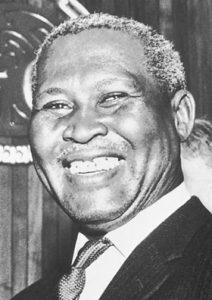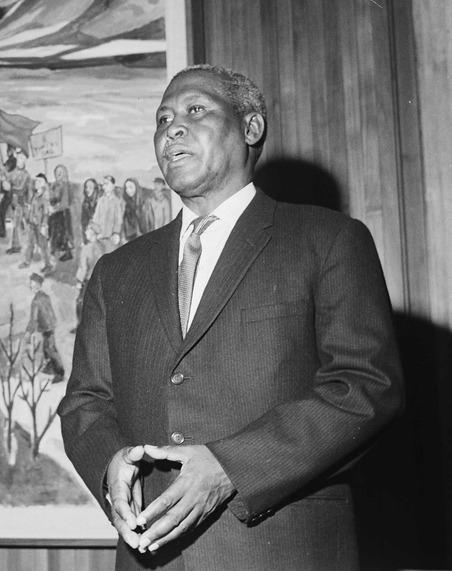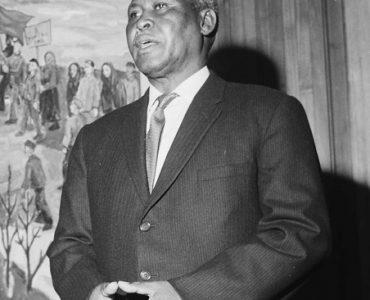Albert John Luthuli (often spelt Lutuli c. 1898 – 21 July 1967), was a South African teacher, activist, Nobel Peace Prize winner and politician. Luthuli was elected president of the African National Congress (ANC) in 1952. At this time, an umbrella organisation that led opposition to the white minority government in South Africa. He was awarded the 1960 Nobel Peace Prize for his role in the non-violent struggle against apartheid. He was the first person of African heritage to be awarded the Nobel Peace Prize. Albert John Mvumbi Luthuli was born in Solusi Mission Station near Bulawayo, in Southern Rhodesia, in what is now known as Zimbabwe. John Bunyan Luthuli, Albert’s father, died when Albert was a young child. Sometime between 1906 and 1908, he accompanied his mother to his ancestral home in Groutville. There he lived in the household of his uncle, Martin Luthuli, who had succeeded his grandfather as the tribal chief.
 In 1933 the tribal elders asked Luthuli to become chief of a Christian branch of the Zulu tribe in succession to his uncle. For two years he hesitated, but accepted the call in early 1936 and became a chieftain. He held this position until he was removed from his office by the Apartheid government in 1953.
In 1933 the tribal elders asked Luthuli to become chief of a Christian branch of the Zulu tribe in succession to his uncle. For two years he hesitated, but accepted the call in early 1936 and became a chieftain. He held this position until he was removed from his office by the Apartheid government in 1953.
In 1944, Luthuli joined the African National Congress (ANC). In 1945 he was elected to the Committee of the KwaZulu Provincial Division of ANC and in 1951 to the presidency of the Division. The next year, he joined with other ANC leaders in organising nonviolent campaigns to defy discriminatory laws. The government, charging Luthuli with a conflict of interest, demanded that he withdraw his membership in ANC or forfeit his office as tribal chief. Refusing to do either, he was dismissed from his chieftainship. A month later, Luthuli was elected president-general of ANC, formally nominated by the future Pan Africanist Congress leader Potlako Leballo. Responding immediately, the government imposed two- year bans on Luthuli’s movement. When the second ban expired in 1956, he attended an ANC conference only to be arrested and charged with treason a few months later, along with 155 others. In December 1957, after nearly a year in custody during the preliminary hearings, Luthuli was released and the charges against him and sixty-four of his compatriots were dropped.
Another five-year ban confined him to a 15-mile (24 km) radius of his home. The ban was temporarily lifted while he testified at the continuing treason trials. It was lifted again in March 1960, to permit his arrest for publicly burning his pass following the Sharpeville massacre. In the ensuing state of emergency he was arrested, found guilty, fined, given a suspended jail sentence and returned to Groutville. One final time the ban was lifted, this time for 10 days in early December 1961, to permit Luthuli and his wife to attend the Nobel Peace Prize ceremonies in Oslo.
He published an autobiography entitled Let My People Go.
In 1966, he was visited by United States Senator Robert F. Kennedy, who was visiting South Africa at the time. The two discussed the ANC’s struggle. Senator Kennedy’s visit to the country and his meeting with Luthuli in particular, caused an increase of world awareness of the plight of black South Africans.
Luthuli spent his last years in enforced isolation while African National Congress abandoned the policy of nonviolence. He also suffered from high blood pressure, once having a slight stroke. As he grew older, his hearing and eyesight also became impaired. On 21 July 1967, Luthuli was fatally injured when he was struck by a freight train while walking across a trestle bridge over the Umvuti River near his home in Stanger (now KwaDukuza).
Additional source: Wikipedia


